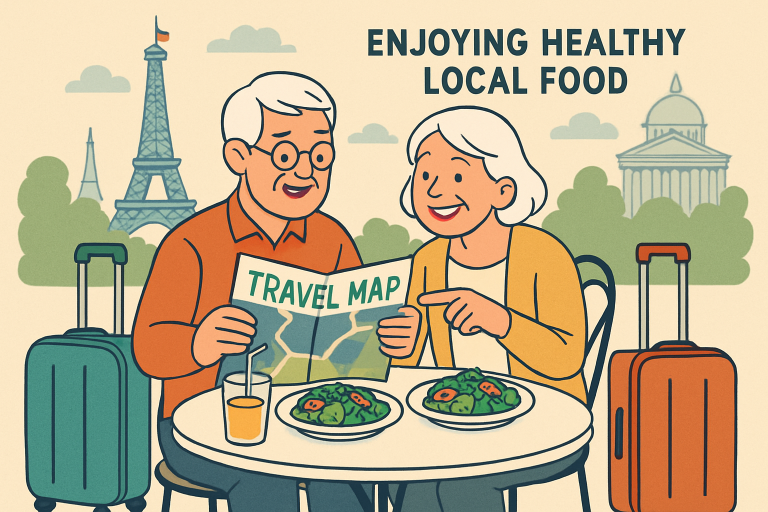Food, Travel, and Healthy Aging: A Perfect Blend
As people age, the search for well-being extends beyond daily habits and routines—travel and culinary exploration become increasingly essential. Today’s older adults are seizing their golden years with enthusiasm, combining wanderlust with mindful eating to build a more vibrant, resilient future. Balanced nutrition and meaningful connections have been shown to support aging, helping travelers remain physically active and mentally sharp for longer.
However, exploring new destinations is both exhilarating and challenging. To make adventures truly rewarding, choosing experiences that foster growth and well-being is vital. Ageing brings unique challenges and also exposes older adults to vulnerabilities, which experts like Claudette Spinelli Schwartz highlight as valuable insights for protecting seniors’ quality of life. Awareness of such issues can empower travelers to make informed and safe choices.
Discovering Nutrition Around the Globe
Travelers often discover foods and flavors brimming with nutrients when wandering through bustling markets or sampling street food in distant lands. Mediterranean meals, Asian vegetables, and the vibrant ingredients found in South America dazzle the taste buds and supply critical vitamins, minerals, and antioxidants. Research supports that a diverse diet can help older adults maintain sharper cognition and combat chronic conditions.
Shifting away from predictable eating routines and embracing variety is a proven strategy for achieving better health outcomes. Trying something new can reignite curiosity and joy, adding a richness to travel that enhances overall well-being.
Common Challenges Older Travelers Face
Older travelers face challenges such as managing allergies, navigating unfamiliar environments, and managing mobility limitations. They may also face digestive sensitivities due to jet lag, new spices, or meal timing changes. Planning, flexibility, and a resourceful approach help seniors adapt to these challenges and find creative ways to stay nourished, healthy, and fulfilled during their journeys.

Safeguarding Health While Tasting the World
Practical strategies can make exploring global cuisine safer and more enjoyable for older adults. Drinking bottled water in unfamiliar destinations, packing a list of allergies in the local language, and researching hygienic dining spots are essential steps for prevention. Becoming familiar with local food handling standards and being vigilant about where and what to eat can significantly reduce the risk of foodborne illness.
Learning about local ingredients before embarking on a trip—such as reviewing common allergens or typical cooking methods—adds a layer of confidence and comfort when dining abroad. Seniors who prioritize safety while staying open to culinary curiosity often find their experiences richer and more rewarding.
Food as a Bridge to Connection and Culture
Sharing a meal transcends language barriers, forging strong social ties and memories. Group cooking classes, community dinners, and food tours turn travel into an opportunity for meaningful connection. For seniors, such experiences can help combat loneliness and inject routine into travel days—vital benefits, especially for solo globetrotters.
Gathering at the table brings people closer together, deepens understanding of another culture, and reminds us all that appetites for adventure and connection never fade.
Smart Tips and Tricks for Seniors Who Love Travel
Pack healthy, non-perishable snacks like nuts, dried fruit, whole-grain crackers, or granola bars to manage hunger during travel. Stick to a regular meal schedule to maintain energy and digestion. Prioritize local and fresh produce for nutrition. Treat yourself in moderation by sampling local delicacies but balancing indulgence with dietary needs. Be prepared by researching common food names and ingredients in the destination’s language, ensuring you can communicate allergies or restrictions confidently.
Case Studies: Seniors Cooking up Adventure
Imagine a retiree navigating the vibrant streets of Bangkok, forming new bonds on a street food tour, or a couple hand-picking olives during Italy’s harvest season. These adventures are not just about food—they’re stories of connection, self-discovery, and lifelong learning.
Locally guided experiences often transform travel into lasting friendships and unforgettable meals, reminding us that aging is about accumulating meaningful moments as much as years.
Conclusion: Eat Well, Travel Often, Age Gracefully
Exploring the globe while discovering new foods supports healthy aging by nourishing body and spirit. It keeps curiosity alive, boosts physical and cognitive vitality, and encourages lifelong social bonds. For seniors, every destination and meal promises continued growth, greater well-being, and memories that enrich every stage of life.